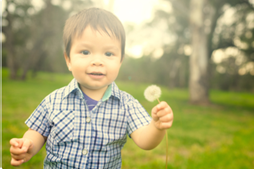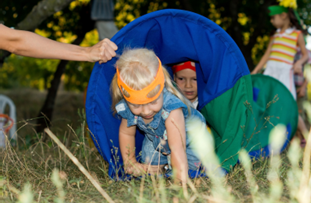Your One Year Old
 During the 12 months between ages 1 and 2, you'll watch your baby start to become less like an infant and more like a toddler. You'll witness a physical transformation as your 1 year old begins to master new motor skills that help them gain a bit of independence and you'll likely begin to see their unique personality emerge.
During the 12 months between ages 1 and 2, you'll watch your baby start to become less like an infant and more like a toddler. You'll witness a physical transformation as your 1 year old begins to master new motor skills that help them gain a bit of independence and you'll likely begin to see their unique personality emerge.
You are stepping into a beautiful but also challenging time. Babies learn from their environment, and parents and caregivers are the role models that they observe and follow in order to learn about the world around them.
Knowing how to set boundaries, encourage positive behaviors, help them explore their environment, and let them get a little messy every now and then will help you enjoy this transitional phase to toddlerhood.
Language Development
You'll likely see some big changes when it comes to your child's language development this year. Between 12 and 24 months, your child is likely to be able to recognise named items, like a cat or dog. They will also be able to play simple make-believe games and show an improved ability to follow your instructions.
At the end of your baby's first year, they are still likely to rely on non-verbal strategies, such as pointing, gesturing, or throwing items. But the coos and screams of early baby talk will give way to distinct babbling sounds like "da," "ba," "ga," and "ma." Your child will slowly begin to pull those together into recognisable words (including "mama," "dada" or another special name for you), and all the while, comprehend more of what you're saying—even "No," although they may choose not to comply.
Before your child's second birthday, they will likely be able to say simple sentences with two to four words and point to simple objects when you name them.
Physical Development
The 12-month mark will likely mean some big changes for your child. In a short amount of time, they're likely to go from crawling to walking, and before you know it, trying to climb stairs and navigate through your home without any assistance.
Some babies begin to walk around 12 months old, while others wait a little longer (around 14 to 15 months). No matter when it happens, there are certain signs that show your little one may be ready to take those exciting first steps:
- Pulling up to a stand
- “Cruising,” or holding onto something (like a table) while walking
- Standing without support
Play
Play is important to a child's development at this age. Your 1-year-old's newfound dexterity will make them eager to investigate nearby objects.
Musical instruments that your child can shake or bang and toys that have levers, wheels, and moving parts are all popular at this age. Blocks are always a good choice, especially when your child gets to knock down a tower you build together.
Emotional and social development
While you may notice your 1-year-old become a bit wary of strangers, you'll also see an amazing desire to interact with others, especially siblings and regular caretakers. Your child may even become excited to see other children, such as at a library storytime or at the playground.
For the most part, 1-year-olds prefer to play next to other children, as opposed to with them. This is called parallel play. But you may see your child begin to include other children in their play at times.
Of course, your 1-year-old won't understand what it means to share and might be very possessive of their toys. Don't insist that they share with the other children—instead, give them a few items that are off-limits from everyone else so they feel like they have some control over their play.
You'll notice that your 1-year-old smiles and laughs in reaction to someone else or while they are playing with toys. (This makes your playtime with them even more fun!) On the flip side, they may also cry when they see another child upset—but that's not a bad thing. Research has shown that young babies are able to show empathy, meaning they react to the pain of others as though it were happening to them. If your 1-year-old has a sibling, you've likely noticed this quite a bit.
How to help your child learn and grow
Talk about energy! Your 1-year-old is either on the move or working on it, which definitely keeps you on your toes. You're likely trying to get your picky toddler to sit still enough to eat three meals a day and keeping your fingers crossed that they actually nap.
This age is a fun time to play with your baby. You can support their budding independence by offering choices—hold out two different toys and let them pick which one they want to play with. You'll likely see problem-solving skills begin to improve as they figure out how to manipulate toys or put a block inside of a box.
To help your baby develop verbal skills, talk to them frequently. As you dress them, talk about the color of the clothes, the feel of the fabric, the name of the body part you're touching. Name items that you use every day, like towels, cups, the car, dolls, etc.
Try to be consistent and avoid using cutesy names, such as "toesy-woesies" for toes. Labeling will help your child learn vocabulary words and prepare for speaking on their own.
Most babies this age need about 11 to 14 hours of sleep a day, including one or two daytime naps. By 18 months old (or sooner), your baby may start to fight their morning nap, which is an indicator that they might be ready to condense two naps into one afternoon nap.

When to be concerned
All children grow at their own pace and in their own way, but there are certain signs that your child may be experiencing a developmental delay.
- Can't walk independently
- Doesn't point to show you things
- Doesn't copy others
- Doesn't try to say three or more words besides “mama” or “dada”
- Doesn't notice or mind when a caregiver leaves or returns
- Loses skills or abilities they previously had


